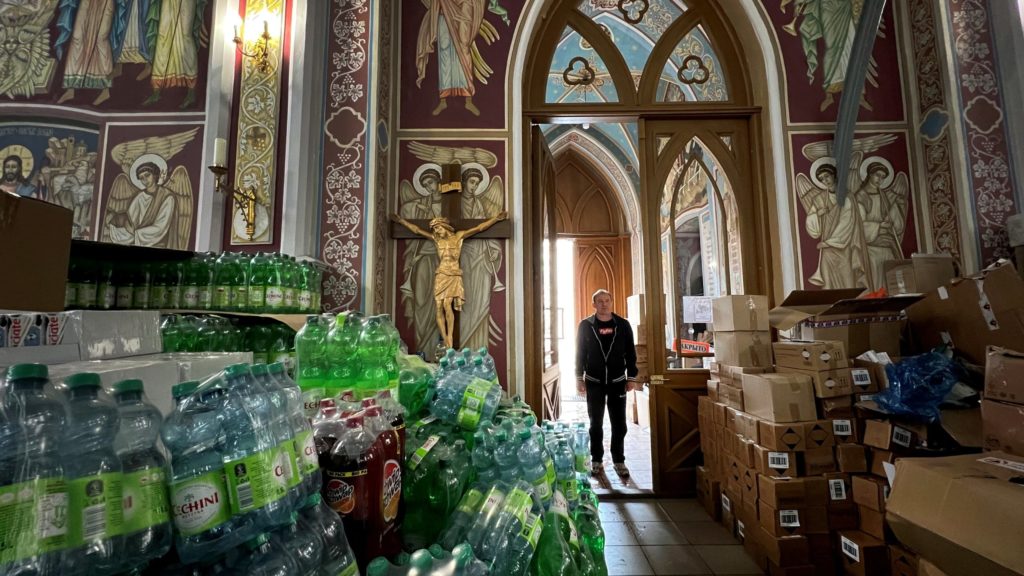An annual collection for struggling Catholic churches in Eastern Europe has taken on new meaning as war rages in Ukraine.
On Ash Wednesday, Feb. 22, faithful across the country are being asked to donate to the U.S. Conference of Catholic Bishops' Collection for the Church in Central and Eastern Europe.
Some dioceses will schedule the appeal on a different date, and the USCCB's #iGiveCatholicTogether website, usccb.igivecatholictogether.org, is also accepting donations through a dedicated page.
Launched in 1991 as communist regimes collapsed throughout Europe, the appeal aids Catholics in 28 European countries in various stages of recovering from longtime totalitarian oppression: Albania, Armenia, Azerbaijan, Belarus, Bosnia and Herzegovina, Bulgaria, Croatia, Czechia (Czech Republic), Estonia, Georgia, Hungary, Kazakhstan, Kyrgyzstan, Latvia, Lithuania, North Macedonia, Moldova, Montenegro, Poland, Romania, Russia, Serbia, Slovakia, Slovenia, Tajikistan, Turkmenistan, Ukraine and Uzbekistan.
Since 2001, the collection has raised nearly $179.2 million, according to Mary Mencarini Campbell, executive director of the USCCB's Office of National Collections.
In 2021, the effort enabled the USCCB to fund 348 grants totaling $6.5 million in support of pastoral and humanitarian work, vocation development and seminary education.
Now, one year into Russia's full-scale invasion of Ukraine -- which continues attacks on Ukraine launched since 2014 -- the U.S. Church's support has become more crucial than ever, said Bishop Jeffrey M. Monforton of Steubenville, Ohio, chairman of the USCCB's Subcommittee on Aid to the Church in Central and Eastern Europe.
“As the war began, Catholics in the United States quickly mobilized to help Ukrainians," Bishop Monforton said in a statement. "I pray that you will continue that generosity to Central and Eastern Europe, bringing healing where there is war, hope where there is despair and faith that will lead to justice and peace.”
In Ukraine, funds from the collections are enabling Caritas Ukraine -- part of the Catholic Church's global humanitarian outreach, Caritas Internationalis -- to provide close to 3 million Ukrainians with food, water, shelter and other basic necessities amid Russia's relentless attacks upon civilian targets, said the agency's communications manager, Odarka Bordun, in an email to OSV News.
Last year, Caritas Ukraine -- which relies on foreign donors for 94% to 97% of its funding -- distributed more than 1.96 million food boxes or hot meals, 710,000 hygiene kits, 147,000 places of temporary shelter, 96,000 cash grants and 272,000 psychosocial support services. With Russian missiles routinely striking residential areas, the most urgent needs also include "the renovation of destroyed houses," Bordun told OSV News.
Through a joint project with the U.N. High Commissioner for Refugees, or UNHCR, Caritas Ukraine assisted "more than 1,700 households in six regions or Ukraine" with repairs, she said.
Mobile Caritas Ukraine teams also work close to the front line, wearing "protective vests and helmets," said Bordun, noting that "as outreach continues to grow, there still remains a need" for additional protective gear.
The agency also is working to heal minds and spirits ravaged by the war, said Bordun.
"It is clear that many people need psychological assistance," she said, noting the high incidence of post-traumatic stress disorder and "the devastating impact (of the war) on children and families."
In neighboring Moldova, home to just 20 Catholic parishes, the USCCB collection is a lifeline, said Elena Ajder, financial director for the Roman Catholic Diocese of Chișinău.
"It ensures the existence of the Roman Catholic Church in Moldova, in an ex-Soviet republic where there are very few Catholics," Ajder told OSV News. "Unfortunately … Moldova is one of the poorest countries in Europe, and there are no resources in the country to maintain support of the church communities. So any support from our Western partners, especially the USCCB is a great asset. It is so necessary."
At the same time, Moldova -- which Ajder described as "a small country with a big heart" -- has welcomed hundreds of thousands of Ukrainian refugees. By May 2022, more than 460,000 had crossed into Moldova, whose population is estimated at 2.7 million, according to the UNHCR. As of October 2022, some 90,000 had chosen to remain in Moldova.
"The first day the war started, we opened the doors of our centers to receive refugees," said Ajder. "We offered meals three times a day, psycho-emotional support, legal support, educational centers for kids, all with the (help) of our partners, including the USCCB."
Such centers have been havens where Ukrainian refugee children can "develop their capacities and abilities" despite "all the negative emotions and stress around us," Lulia Larîeva, project manager for the Chișinău Diocese, told OSV News.
Ajder said the collection funds also help to sustain the five Catholic parishes in Moldova's easternmost region, an internationally unrecognized, pro-Russian area separatists call Transnistria. Some 1,500 Russian troops are currently stationed there, and Russian Foreign Minister Sergey Lavrov has menacingly warned Moldova could become "another Ukraine."
In a Feb. 13 press conference, Moldova President Maia Sandu announced her administration had uncovered plans by Russia to sabotage her government and "place it at the disposal" of that nation.
Priests in the region are working diligently while trying "not to attract attention," Ajder told OSV News.
"If they announce from the altar, 'we are against this war, and let's pray for peace,' they are invited to the so-called militia and interrogated for hours," she said. "And they are told to keep silent, or they will be exiled from the country."
With the support of the USCCB collection, the Chișinău Diocese is "continuing to help (the church in) Transnistria," said Ajder. "It's not left aside."

